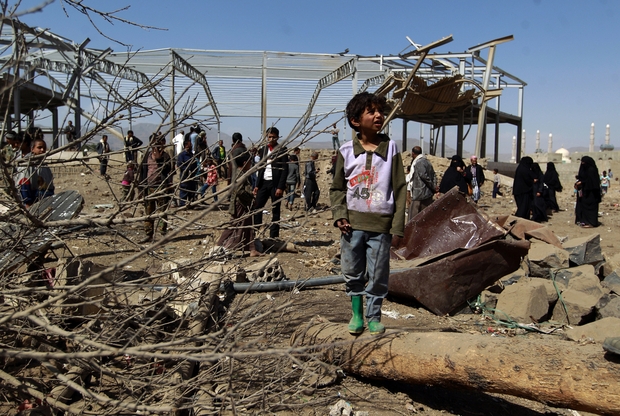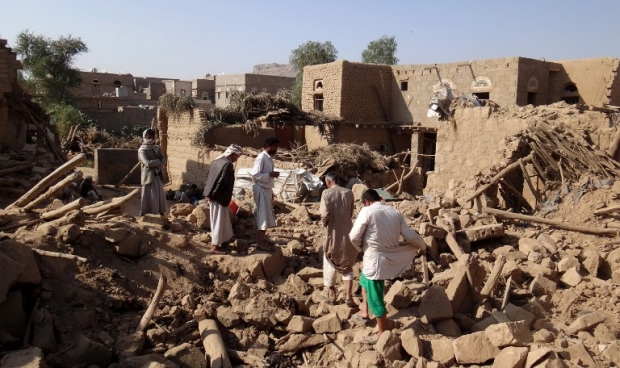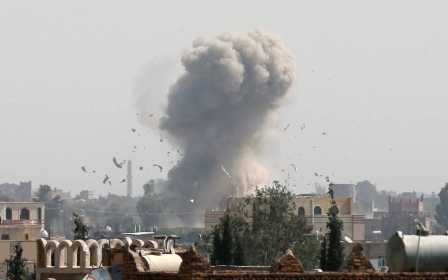UK government 'ignored advice and continued Saudi arms sales'

The British government ignored the advice of its own arms control experts and refused to suspend the sale of arms to Saudi Arabia, a London court heard on Tuesday.
The revelation that a senior civil servant at the then-Department of Business, Innovation and Skills (BIS) warned against continued exports a year ago, came in evidence during a landmark judicial review at the High Court.
The review, brought by Campaign Against The Arms Trade (CAAT), is set to determine the legality of the UK government’s arms transfers to Saudi Arabia amid the current armed conflict in Yemen.
Documents presented in court revealed that discussions over the warning from the senior civil servant, the head of policy at the Export Control Organisation, then part of BIS, reached the highest levels of government and were presented to then-prime minister David Cameron.
The court also heard that officials within the Ministry of Defence had removed a column in a tracking system dedicated to recording concerns over human rights violations committed by Saudi forces.
It heard that officials concerned with “gaps in knowledge” over the use of British weapons warned ministers that they should suspend arms exports.
READ: War in Yemen: Why the UK should host peace talks
Despite human rights fears over Saudi Arabia’s ongoing bombing campaign in Yemen, Britain has exported £3.3bn ($4.1bn) of weapons to the kingdom since 2015, including fighter jets and munitions.
In the first day of a three-day hearing - half of which will be held in secret to protect sensitive information presented by the government - lawyers for CAAT argued that sales had been taking place despite evidence that there was a “clear risk” of Saudi forces using British-made equipment to violate international humanitarian law in Yemen.
An email seen by the court from Edward Bell, the policy head of the Export Control Organisation, to the permanent secretary of BIS, said: “To be honest, and I was very direct and honest with the SoS [Secretary of State], my gut tells me we should suspend. This will be prudent and cautious given the gaps in knowledge about Saudi operations. I put this directly to the SoS in these terms.”
BIS has since been consumed by the Department For International Trade, which now oversees arms export licences.
'A lot at stake politically'
Bell went on to warn that although “there is a lot at stake here politically” concerns over politics could not come into play if there was a clear risk that Saudi forces were breaching international humanitarian law.
The email was sent on the morning of 11 February 2016, the day that the British government decided that it would not be suspending arms exports.
The email, which remains heavily redacted, reveals that the “matter” of arms exports and concerns over violations of International Humanitarian Law (IHL) were taken to Downing Street.
READ: The world needs to wake up to Yemen's unfolding calamity
Explaining his decision to Cabinet colleagues, Sajid Javid, the then-business secretary with decision-making responsibility for arms exports, admitted that there was “uncertainty and gaps in the information available” to him.
The court heard that Bell had advised the secretary of state that officials had “significant concerns regarding the acknowledged gaps in knowledge about Saudi targeting processes and about the military objectives of some of the strikes.”
The first day of the court case saw barristers for CAAT argue:
Ministry of Defence documents reveal that officials only tracked "a very, very small percentage of the overall coalition air strikes" in Yemen
British officials have "no insight into incidents caused by artillery attacks or attack helicopters" as they have "no visibility" of Saudi-led ground forces in the conflict
Despite claims of a close relationship with Saudi Arabia, the MoD has no access to "any of the operational intelligence" used by Saudi-led forces and do not have access to the "targeting process"
The British government has "very little insight into so-called dynamic" strikes, where a mission isn't pre-planned and the pilot makes the decision to deploy munitions.
The court also heard that the MoD’s in-house system for examining violations, known as “the Tracker”, was never used to raise concerns of IHL violations. It also does not “consider whether it does not “consider whether the strike was against a target (such as a hospital) that attracts special protection”.
Nor does it consider “the alleged consequences of a strike, including the reported civilian casualties”.
“We now know the MoD conducts no routine attempt to reach an assessment in any individual case” to establish whether IHL [international humanitarian law] had been breached, said Chamberlain, counsel for CAAT.
Of 114 allegations of concern looked at in the spreadsheet up to January 2016, over a third were judged to be probably coalition air strikes.
“Of these, MoD was unable to identify a legitimate military target in the majority,” the Foreign Office wrote in advice to officials, which was available to ministers.
UN experts said last week that 10 air strikes by the Saudi coalition which killed at least 292 civilians may have been war crimes. The Saudis denied the claims. The panel said the Houthis were probably also guilty of war crimes.
The UN said last month that more than 10,000 people had died in the conflict, 40,000 had been injured and more than 10 million needed "urgent assistance".
A new report by Medecins Sans Frontieres says the charity has treated 10,700 wounded in the city of Taiz, and a quarter of casualties in the second half of last year were women or children. They say health services have collapsed in Taiz – a city the size of Edinburgh.
A ruling from judges Lord Justice Burnett and Justice Haddon-Cave is not expected until March.
If the campaigners win, the court will have to decide if arms sales should be halted immediately even if the government appeals.
The case continues on Wednesday.
Middle East Eye propose une couverture et une analyse indépendantes et incomparables du Moyen-Orient, de l’Afrique du Nord et d’autres régions du monde. Pour en savoir plus sur la reprise de ce contenu et les frais qui s’appliquent, veuillez remplir ce formulaire [en anglais]. Pour en savoir plus sur MEE, cliquez ici [en anglais].





